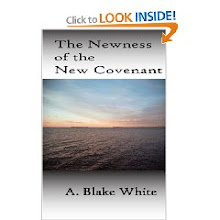 DEFINITIONS OF NCT
DEFINITIONS OF NCTAllow me to give you a handful of definitions for NCT. Interestingly, these are not really technical definitions. One can search high and low and he will not find a technical definition of NCT given by NCT adherents. Nevertheless, the statements below are quotes from various sources that I believe give to us a broad definition of NCT.
The first one comes from our friend and speaker for the Laurelville Conference, Fred Zaspel. Here is what Fred says about NCT:
“New Covenant Theology (NCT) is a less settled theology than a movement still in the shaping by men who agree that the question has not yet been finally answered by either of the major competing schools of interpretation- dispensational theology and covenant theology…NCT claims simply to have middle ground between these two (DT and CT). We are not satisfied with the simple ‘one covenant’- ‘two administrations’ idea of CT. In our judgement this results in a rather ‘flat’ reading of Scripture which fails to appreciate the advance, the distinctively new character of the Messianic age. Nor are we satisfied with the over-compartmentalizing tendency of Dispensational theology. In our judgement its ‘no law’ and ‘two equal peoples’ notions failed to appreciate the unity of God’s nature and purpose. And so we find ourselves somewhere between the two traditional answers”.( Fred Zaspel, A Brief Explanation of New Covenant Theology).
If I can, allow me to point out a couple of features in Fred’s explanation of NCT. First, Fred speaks of NCT as more of a movement than a defined or settled system. This is important to grasp. I have found that there are many “streams”, if you will, of NCT. And not all of these “streams” converge into the same body of water. In fact, I recently asked Tom Wells (the foremost New Covenant Theologian) about this very topic. He was clear that all “streams” of NCT are not in complete agreement with one another. Quite frankly, it is even difficult to identify these streams. Suffice it to say, however, NCT is not as sharply defined as either DT or CT. This is not a criticism; it is a fact. It must be stated that this is also true with both DT and CT as well. There are many “streams” within each one of these systems. Nevertheless, it seems that with NCT the streams are more diverse, and are greater in number. However, it is difficult to know for sure. I do not know every dispensationalist, covenant theologian, and new covenant theologian. This is another reason why neither what others believe, nor logic itself should ever serve as the foundation to our belief systems. Scripture is the basis. And by the way, Scripture is logical (that is not to say that there are not mysteries found in paradox form), and Biblical truth will generally show itself in the majority positions of the church throughout church history.
“New Covenant Theology (NCT) is a less settled theology than a movement still in the shaping by men who agree that the question has not yet been finally answered by either of the major competing schools of interpretation- dispensational theology and covenant theology…NCT claims simply to have middle ground between these two (DT and CT). We are not satisfied with the simple ‘one covenant’- ‘two administrations’ idea of CT. In our judgement this results in a rather ‘flat’ reading of Scripture which fails to appreciate the advance, the distinctively new character of the Messianic age. Nor are we satisfied with the over-compartmentalizing tendency of Dispensational theology. In our judgement its ‘no law’ and ‘two equal peoples’ notions failed to appreciate the unity of God’s nature and purpose. And so we find ourselves somewhere between the two traditional answers”.( Fred Zaspel, A Brief Explanation of New Covenant Theology).
If I can, allow me to point out a couple of features in Fred’s explanation of NCT. First, Fred speaks of NCT as more of a movement than a defined or settled system. This is important to grasp. I have found that there are many “streams”, if you will, of NCT. And not all of these “streams” converge into the same body of water. In fact, I recently asked Tom Wells (the foremost New Covenant Theologian) about this very topic. He was clear that all “streams” of NCT are not in complete agreement with one another. Quite frankly, it is even difficult to identify these streams. Suffice it to say, however, NCT is not as sharply defined as either DT or CT. This is not a criticism; it is a fact. It must be stated that this is also true with both DT and CT as well. There are many “streams” within each one of these systems. Nevertheless, it seems that with NCT the streams are more diverse, and are greater in number. However, it is difficult to know for sure. I do not know every dispensationalist, covenant theologian, and new covenant theologian. This is another reason why neither what others believe, nor logic itself should ever serve as the foundation to our belief systems. Scripture is the basis. And by the way, Scripture is logical (that is not to say that there are not mysteries found in paradox form), and Biblical truth will generally show itself in the majority positions of the church throughout church history.
Second, Fred speaks of NCT as holding a “middle ground” position between DT and CT. This is an important clarification. NCT does not take attributes of DT and place them in their system and then turn around and take elements of CT and store these in their system. Rather, NCT bases its arguments on Scripture. It is not a hodge-podge of DT and CT. Fred’s point is simply that in the final analysis NCT ends up somewhere between these other two systems of theology. Fred’s explanation serves in truly clarifying what we are facing with NCT.
Another way to define NCT is rooted in a short, pithy statement by a man I have yet to meet (but long to someday), John Reisinger. He once made the remark that, “Dispensationalism cannot get Israel and the church together in any sense whatsoever, and covenant theology cannot get them apart”. Essentially, Reisinger is affirming the failure of both DT and CT. Their failure is found in different aspects of the same topic- the identity of the church and national Israel. DT affirms that there are two peoples of God. Thus, they fail to define any unity in God’s elect people of all time. And CT, on the other hand, fails to separate Israel from the church. They view these two people as one entity. Reisinger’s point is that both positions are wrong. And the implication is that NCT holds the right answer. I agree with him and will seek to prove that in the remaining posts on NCT.
The next definition is take from Gary Long. He says, “NCT is a developing system of theology that provides a more biblical way to interpret the Scriptures by questioning key theological presuppositions which undergird the hermeneutics (principles of interpretation) of CT and DT” (Gary Long, New Covenant Theology Disnitctives). Gary Long is a strong NCT proponent. However, he refuses to “throw the baby out with the bath water” (sorry to use such a routine cliché). I appreciate his intellectual perceptiveness, and honesty of character to admit that not everything DT and CT teach is heretical and Satanic. Notice he says that NCT promotes " a more Biblical way" than either DT and CT. This is NCT being worked out practically- the demonstration of love toward others. He does not compromise truth. No, no! But he is also not condescending in his attitude.
One final way to understand NCT can be seen in the following statement:
“New Covenant Theology (NCT) describes how the unfolding plan of salvation in Scripture is to be understood. It focuses on the relationship between the Old and New Covenants. It views the nation of Israel as a picture of the people of God but not the believing people of God. It understands the Mosaic Covenant to be a legal covenant that demands perfect obedience in order to receive the promised blessings. It views the Ten Commandments as the essence of the Mosaic law and not the essence of all of God’s law. It views the New Covenant as a new and better covenant that replaces the Old Covenant. New Covenant Theology differs from both Covenant Theology and Dispensationalism” (Defining New Covenant Theology, Geoff Volker and Mike Adams from In Depth Studies).
Lord willing, we will look at some distinctives of NCT later.








Dear Andy,
ReplyDeleteFirst of all I would like to express my appreciation for today's addition to your blog.
I agree with you. NCT is a growing dialogue among those who are seeking to know more of our Christ and His present rule in the hearts of His New Covenant children.
I have in recent years found myself in a growing and maturing dialogue dealing with the implications of the Letter/Spirit contrast as explained by Paul in 2Cor 3. In Galatians Paul by the Spirit of God instructs the church that the rule of Law has come to an end and that the reign of the Spirit has begun. If so, then where then do we determine our our ethic? From the Letter or the Spirit? As one writer has offered, do we now bring in just a little of the Letter through the backdoor? The last thing we would want is a new yard stick for measuring if one is holy.
Enjoying your posts! Keep up the good work.
Moe Bergeron
It is good to see more exposure of reasoning through what we term NCT. Perhaps realizing that many issues have been discussed in many formats this link may be of benefit to you.
ReplyDeleteThere are a number of meetings and discussions in video and audio format that have been done in the past few years that are listed here: http://fbceny.org/blog
We know and have appreciated Fred, John, Tom Wells, Gary Long, Jon Zen, the brothers at IDS and others for many years and there is a whole new, world wide, generation of those, who are reasoning along these lines.
Thanks for what you are doing.
Joe Krygier
Moe,
ReplyDeleteI think your question deals with the heart of NCT. In fact, the Law/Spirit issue has kept me awake many nights as I ponder its complexities in bed! I do not by any means think I have figured out all the answers. However, the more I grow in my understanding of the new covenant age being the "age of the Spirit" in the sense that the Spiri of God now indwells believers, the more I am convinced that this Spirit never works apart from God's law. All the major prophecies of the new covenant (Joel 2; Jer. 31; Ez. 36) emphasis the role of the Spirit in the new covenant. Those passages also mention, however, what it is that the Spirit of God will do when He regenerates hearts- He will write His laws and statutes (principles) on their hearts. Thus, I am becoming increasingly convinced that NCT will result in a more robust understanding of what progressive sanctification involves. In other words, the Spirit never works apart from God's law. In the new covenant, however, it is not Mosaic law, but the law of Christ that the Spirit writes on regenerate hearts. And if the Spirit never works apart from God's law, then a true believer will be characterized by obedience to God's statutes/laws as a response of gratitude for the Gospel.
So here is my answer to how we determine the NCT ethic (take it for what it is worth because I still have a lot of thinking to do!):
our ethic is determined by both Law and Spirit. That is, the Spirit of God uses the law of Christ to produce an obedient, ethical life that brings God glory. I could say more, but I will restrain myself. I would like to think on this issue more. Also, I would like to know how you think our ethic is determined. The topic you bring up fascinates me. And, as I said earlier, I believe it deals with the heart of NCT. Feel free to email me anytime- amsmith744@yahoo.com. Great question!
Joseph,
ReplyDeleteI kind of feel like the "new kid on the block" in NCT circles. Thus, I am hungry for any thoughts people might have on NCT. One of the frusterating things about studying NCT is finding sources. There are not that many books on the subject. Therefore, I depend greatly on the internet in seeking answers to questions I have (and I have many). Thank you for the site that you directed me to. I will definitely enjoy viewing and listening to others speak about NCT. Its also encouraging to know that NCT seems to be picking up speed in its influence upon others.
By the way, Moe, I enjoyed your presentation on the Holy Spirit (from the Think Tank, 2008). I listened to it yesterday. I appreiciate what you, Joe, and the others are doing. I will probably have some questions after I listen to the other two audios. Shoot me an email (amsmith744@yahoo.com) if you don't mind, so I can have your email address on hand. Thanks...
ReplyDeleteAndy,
ReplyDeleteWe have just published the video and audio of our informal NCT Think Tank held last week up in the Buffalo, NY area. Check it out at earthstovesociety.com and from there you also see a link to Joe Krygier's blog where there you'll find audio files, better quality video, pictures and manuscripts.
I will email you directly. - Moe